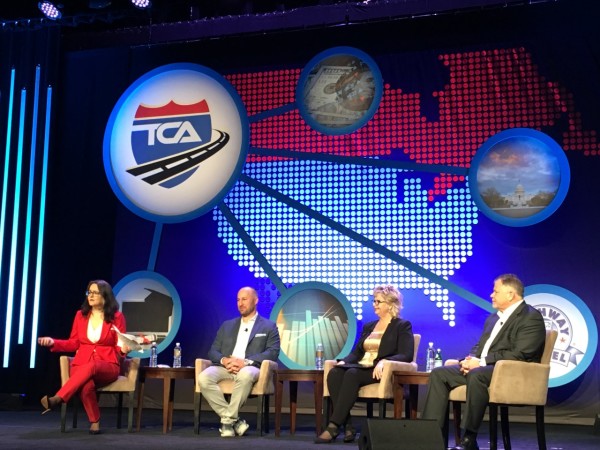Learning from the Best Fleets
LAS VEGAS, Nev. – There are more than half a million trucking companies in the U.S. alone, so to stand out as one of the top 20 according to your human resources programs is impressive to say the least.
At this year’s Truckload Carriers Association convention, Jane Jazrawy, the co-creator of the Best Fleets to Drive For program, moderated a panel of three executives from the Top 20 to discuss what they do to be successful and stand out among the competition.

Panelists included: Sherri Garner Brumbaugh, president and chief executive officer of Garner Trucking; Andrew Boyle, co-president and chief financial officer of Boyle Transportation; and Rick Williams, chairman and chief executive officer of Central Oregon Trucking Company.
Use your millennials to recruit
If you’re lucky enough to be a fleet that has millennials working for you, make sure you use them, Garner Brumbaugh advised.
She had a young female driver working for her, who was one of her best employees.
“I hated taking her off the road because she was one of my drivers,” Garner Brumbaugh said. “But I brought her into the office because I knew she had the talent to be one of our recruiters.”
She added that this 28-year-old driver didn’t believe she could be a recruiter, but Garner Brumbaugh convinced her to.
“As leaders, we have to recognize that quality in people,” she told the audience, adding that her new young recruiter regularly goes to high schools to show them the opportunities available in the trucking industry.
“She isn’t much older than the kids in high school,” she said. “And so when she goes to the schools she connects with them, and brings in the simulator. They love it. They actually line up to play.”
Embrace technology
Plain and simple, if you want to be a Best Fleet you have to be an early adopter, and be open to new technology.
Take ELDs for example. According to Jazrawy, many of the Best Fleets had ELDs long before the mandate was even talked about in recent years.
“It goes back to what responsibilities you put on your company and where,” Williams said. “Part of ELDs is…before them, sloppy operations got put to the driver to fix. They would tell drivers, you run longer, and you run more. I’ve heard people say, ‘We’ll lose production if we’re on ELDs.’ And I’d say ‘Why? We can see things better if we’re planning productively, and we can do a better job.’ We implemented ELDs a long time ago. And we told our drivers, this isn’t a punishment, this is a benefit. We never did it a punitive move. We said, ‘If we can see your time, we can manage it better’.”
Williams said he had a good buy in after rolling out ELD throughout his fleet. And in fact, he found his drivers made more money after implementing ELDS.
“Same thing happened with GPS years ago,” he added. “Drivers said they didn’t want us looking over their shoulder and without GPS tracking, they’re lost. ELDs are the same thing, and now we’re entering the camera phase…it’s all in the adoption and the ROI you’re looking for.”
Guaranteed pay
Boyle Transportation was the first company to talk to Jazrawy about guaranteed pay, she said.
“We were flabbergasted this was happening because we had not heard about it before,” she said.
Andrew Boyle said for 25 years now the company has had some sort of guaranteed wage.
“About five years we implemented it on a weekly basis,” he said. “And it essentially salaries people. So it ranges now from $1540 a week – $1850 a week for starting. That’s your guaranteed pay.”
Boyle said they switched to this method because when drivers are away from home it was hard for them to not have control over how much money they’d make.
“It’s a tough way to live,” he said. “So we changed that because we want a long-term mutually beneficial relationship with our employees. We want to shift that economic risk onto the company, instead of onto the employee.”
Have your say
This is a moderated forum. Comments will no longer be published unless they are accompanied by a first and last name and a verifiable email address. (Today's Trucking will not publish or share the email address.) Profane language and content deemed to be libelous, racist, or threatening in nature will not be published under any circumstances.